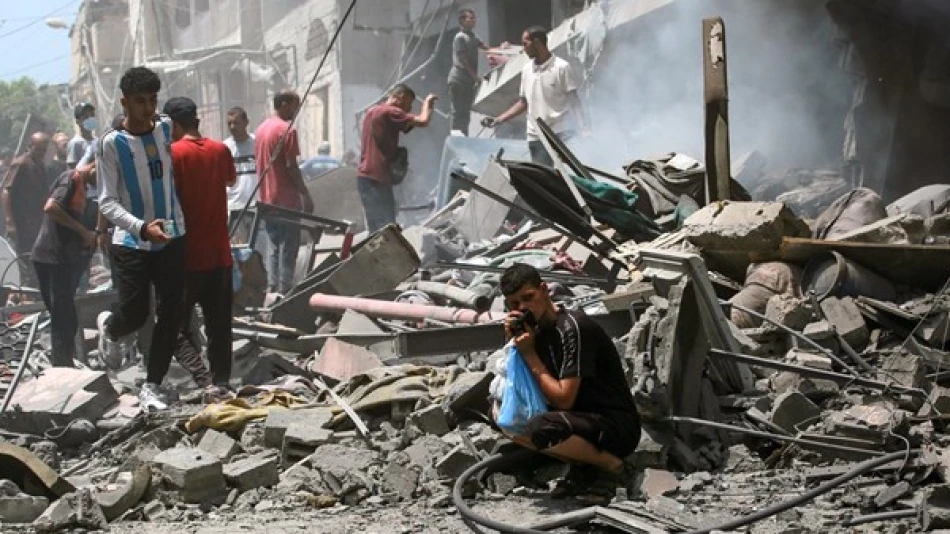
Global Outrage Erupts Over Israel's Alarming Plan to Invade Gaza
Global Outcry as Israel Faces Diplomatic Isolation Over Gaza Occupation Plan
Israel's latest plan to expand military control over Gaza has triggered an unprecedented wave of international condemnation, with major powers threatening concrete consequences including arms embargoes and diplomatic sanctions. The unified global response signals a potential turning point in international patience with Israeli military actions, as even traditional allies distance themselves from what many describe as a violation of international law.
United Nations Warns of "Serious Escalation"
UN Secretary-General António Guterres characterized the Israeli plan as a "serious escalation" that would worsen conditions for millions of Palestinians. His spokesman emphasized that the decision threatens to exacerbate what is already a catastrophic humanitarian situation.
UN High Commissioner for Human Rights Volker Türk went further, demanding an immediate halt to the plan. Türk argued that the move directly contradicts the International Court of Justice ruling requiring Israel to end its occupation as quickly as possible and respect Palestinian self-determination rights.
Legal Implications Mount
The UN's invocation of the ICJ ruling adds significant legal weight to the condemnation. This reference to existing international court decisions suggests that Israel's actions could face formal legal challenges, potentially including referrals to international criminal courts.
Arab Nations Unite in Condemnation
Regional powers delivered some of the harshest criticism, with Saudi Arabia, Egypt, and Jordan issuing strongly-worded statements that go beyond typical diplomatic language.
Saudi Arabia's foreign ministry used unusually direct terms, condemning what it called "crimes of starvation and brutal practices and ethnic cleansing against the Palestinian people." This language from a key US ally in the region signals a significant diplomatic shift.
Egypt framed the plan as an attempt to "consolidate illegal Israeli occupation" and "continue the war of extermination in Gaza," while Jordan's King Abdullah II warned that the move undermines the two-state solution and threatens international ceasefire efforts.
European Unity Cracks Israel's Western Support
Perhaps most significantly for Israel's international standing, European leaders are moving beyond verbal criticism toward concrete actions. European Commission President Ursula von der Leyen called for Israel to reconsider the plan, while European Council President António Costa suggested the decision should have "consequences" for EU-Israel relations.
Germany's Arms Embargo Signals Policy Shift
German Chancellor Friedrich Merz announced the suspension of weapons exports that could be used in Gaza, marking a dramatic departure from Germany's historically unwavering support for Israel. This move by Israel's strongest European ally could trigger similar actions across the EU.
Britain's Prime Minister Keir Starmer called the plan "wrong" and demanded immediate reconsideration, warning it would only lead to "more bloodshed." France condemned the plan in the "strongest terms," with Foreign Minister Jean-Noël Barrot arguing that full occupation would worsen the catastrophic situation without securing hostage releases.
Global Powers Align Against Israeli Strategy
China expressed "grave concern" and called for immediate cessation of what it termed "dangerous moves," while emphasizing that "Gaza belongs to the Palestinians." This represents Beijing's most direct criticism of Israeli actions to date.
Turkey urged the international community to prevent implementation of what it called a plan for "forced displacement" of Palestinians, while Belgium summoned the Israeli ambassador to express formal rejection of the decision.
Strategic Implications for Middle East Stability
The unified international response suggests Israel faces its most serious diplomatic crisis in decades. Unlike previous conflicts where Israel maintained support from key Western allies, this situation shows even traditional supporters questioning Israeli strategy.
The convergence of Arab, European, and global criticism creates a diplomatic environment where Israel risks genuine isolation. More importantly, the move from verbal condemnation to concrete actions like arms embargoes indicates that international patience may be exhausted.
Economic and Military Consequences Loom
Germany's arms suspension could trigger broader European restrictions on military cooperation and trade. If other EU nations follow suit, Israel could face significant constraints on its defense capabilities and economic relationships.
The diplomatic pressure also complicates any future peace negotiations, as international mediators now view Israeli actions as fundamentally undermining the two-state solution that remains the cornerstone of global peace efforts.
This crisis represents more than routine diplomatic friction—it signals a potential realignment of international relationships in the Middle East, with Israel increasingly isolated even among its traditional allies. The question now is whether this unprecedented global pressure will force a policy reversal or deepen Israel's international isolation.
Most Viewed News

 Layla Al Mansoori
Layla Al Mansoori






